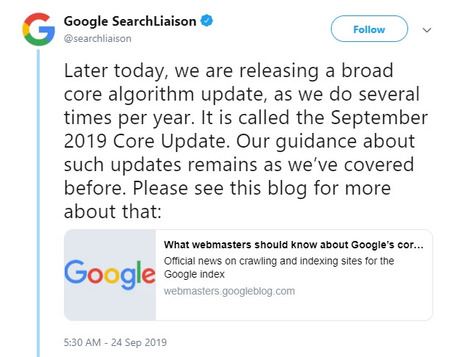Google announced today that a core update will go live on the afternoon of 9/24. While they have not released information regarding what precisely this update will target, it is possible that sites will see some shake ups in the rankings of their pages. This could result in an increase or a decrease in rankings for particular pieces of content.

When we saw the alert about the impending core update, we wanted to bring it to the attention of our community and discuss what this update means for them and their content.
Don’t panic. In a recent post, we pointed out that after core updates there are often adjustments and rollbacks if Google sees sites move more than intended.
What is a core update?
Google reports that they make minor adjustments to their algorithms on a regular basis– nearly daily–as they work to improve their ability to rank websites and serve their users. Often these smaller updates do not attract much notice. A few times a year, however, they release larger updates. These updates often do attract attention as a number of sites see rises and falls in their rankings across multiple pages. They also likely see the corresponding traffic increases and drops as the updates go live.
Google generally acknowledges these core updates, as they want to give site owners more targeted information about what they should focus on improving. For this particular core update, Google has also specifically gone out of their way to point out that sometimes nothing is expressly ‘wrong’ with content that has lost a few positions as a result of a core update. The purpose of the update is not necessarily to penalize content, but rather to find content that has been better written and developed and will be more trustworthy for users. Sometimes this means that content that follows all of the Webmaster’s Guidelines, may still see a drop.
What should I do as we wait for Google’s core update to roll out?
We recommend that our community carefully monitors their sites through the BrightEdge platform. You can set alerts for any key pages within your site so that you receive notifications if they drop too low in the rankings.
Remember to not only watch for site drops, but also keep an eye on any site ranking boosts. Monitoring how different pages rise and fall in the rankings can offer important clues into how this core updates impacts sites, which then provides valuable insight into how rankings can be regained following this drop.
What should I do if my content drops after Google’s core update?
If you notice a drop in your content as this core update rolls out, take a careful look at what specifically dropped and by how much. Keep in mind that Google is not necessarily penalizing your content, it could instead be a reward for another site that has produced strong content. This means there might not be a concrete criteria that needs to be ‘fixed’ to regain the rankings.
Instead, you will want to carefully evaluate the content that fell alongside any content that rose. You also want to look at the material that now ranks higher than yours and try and detect what might have made Google prefer this content over yours. This will be your key to help you determine how to correct your content and improve your site moving forward.
How should site owners try to improve their content if they drop in rankings?
Site owners should pay close attention to Google’s strategy for ranking content. Specifically, their algorithm attempts to identify the Expertise (E), Authoritativeness (A), and Trustworthiness (T) of content. They also instruct their team of search quality raters to score search results based on this criteria. Keep in mind that these raters can not actually impact search results. Instead, their ratings are used to determine the effectiveness of the search algorithms.
If you notice a drop in your rankings, you should carefully evaluate your content based on these criteria. Look at the originality of your content: do you produce any original information or research for your customer? Consider also your own expertise and why people should trust you. Do you give them a good reason to believe what you have to say? Does your site and page layout help to support your expertise? Do you regularly cite sources within your content and otherwise support what you have to say?
Google wants you to focus on producing content that offers high value for your users. Your content should have something that your competitors do not have if you want your piece to rank highly.
Google continues to update their algorithm, and this includes rolling out core updates that have the potential to impact the rankings of large numbers of sites. The search engine giant has given us the heads up regarding this upcoming update and went out of their way to remind site owners that a loss in rankings does not automatically mean that best practices or webmaster’s guidelines have been violated. Instead, the focus lies on content that embodies the E.A.T. criteria to better serve the users. Keep a close eye on your site through the BrightEdge platform and let us know how the update impacts you.
So if your traffic drop was due to an algorithm change and does not revert, what can you do?
Remember, organic search is a long play game, so make your plans, adjust a bit, and keep producing and optimizing relevant and valuable content. We’ll repeat our guidance from our last algo update post for your convenience:
- Increase your content production cadence of blogs, pages, FAQs, glossary, and videos to try to offset the lost traffic
- Continue to focus on high-quality content
- Be authoritative, deep, and relevant, target over 1000 words per piece and preferably over 2000 words
- Be original, fresh, accurate, and current
- Build multiple pieces in a content silo and internally link them together
- Be well liked and linked to internally, externally, and socially
- Work on page load speed until you get to 95 score
- Reduce the bounce rate of people landing on your site
- Provide an excellent customer experience and site performance
- Consider using schema markup, which Google has been promoting since 2011 and people are starting to report positive rank and traffic impact from schema

